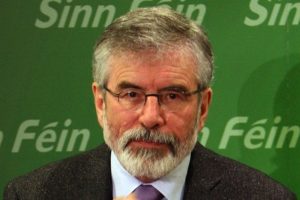 The stage was set for a big step ahead. Then everything fell apart
The stage was set for a big step ahead. Then everything fell apart
Northern Ireland’s would-be peace process
EVERYTHING, it seemed, had been rehearsed. Sinn Fein’s Gerry Adams and the Ulster Unionists’ David Trimble had a deal on the IRA’s readiness for peace. Britain’s Tony Blair and the Irish Republic’s Bertie Ahern would turn up on October 21st, arm-in-arm, to bless the announcement of an election in Northern Ireland on November 26th. Downing Street duly announced it, and up the prime ministers turned. Lights, camera—and then the set collapsed. The dust will clear, but when the votes are counted they may show that moderate unionists have stayed at home in droves, and the only winner is the hardline Reverend Ian Paisley.
The trouble began off-stage. General John de Chastelain, the Canadian chairman of the commission set up to oversee the disarming of the province’s paramilitaries, had indeed seen a decommissioning of IRA weapons, an essential part of the Adams-Trimble deal. But just what weapons, how many and where? The general could not say- the IRA (as it is entitled to) would let him give only a broad description of that which he had seen made “permanently unusable or inaccessible”.
Light, medium and high-grade ordnance, he said, which could include semi-automatic rifles, machine-guns, mortars and anti-tank weaponry. Later briefings suggested Semtex explosive too. The third and largest IRA decommissioning yet, it was said. But no inventory, no video, no location. The general had told the media that his report would be short, and so it was. Talking earlier to the two prime ministers, he had revealed more, but—to their frustration—it had to remain between him and them. From that moment Mr Trimble, with suspicious unionists peering over his shoulder, knew that he would have to put everything on hold.
Efforts to rescue the peace process immediately focused on finding ways to release more information. And a rescue may be possible. The deal had been worked out, mostly, in unprecedented direct talks between Mr Trimble and Mr Adams. Mr Trimble’s own dissidents and Mr Paisley’s Democratic Unionists had always predicted that Mr Trimble would be conned. The moderate nationalists of the SDLP were angry at being sidelined because, although in the last election, in 2001, they had almost as many votes as Sinn Fein, they do not speak for the IRA. But, as officials said, the Trimble-Adams relationship was the real way ahead. And that, at least, seems to have survived.
Before the breakdown, Mr Adams had made a statement speaking warmly of partnership with unionists and committing himself to the “end of physical-force republicanism”, along with other helpful phrases—not enough, in itself, to satisfy Mr Trimble’s voters, but adequate for him and the two prime ministers. If all had gone well, Mr Trimble in turn would have delivered an assurance that he would not again walk out on a power-sharing provincial government or threaten to do so—the step that a year ago brought Northern Ireland back under direct rule from London. And after the breakdown, recriminations were scarce. Mr Trimble blamed republicans, but praised Mr Adams’s words. Mr Adams said little. Both men, anxious to preserve what progress had been made, indicated their willingness to try again.
Can they succeed? The advance publicity for what was meant to happen on Tuesday has not helped. Here, said Downing Street, was the biggest development since the 1998 Good Friday Agreement that gave the province its assembly and devolved power-sharing government. Instead, the breakdown has left one part of the unionist community unconvinced of Mr Trimble’s negotiating skills, the other gleeful at the disarray. Mr Paisley has had a field-day, jeering that the Ulster Unionist leader had been duped by Mr Adams. For their part, republicans said they had fulfilled their side of the bargain and were shocked and angry about what had happened.
The idea had been to give Mr Trimble at least a decent start to his election campaign. When the plan collapsed, his prospects, none too good in even the best of circumstances, looked worse than ever, and Mr Paisley’s still better. Mr Trimble’s party now faces the prospect of coming second to Mr Paisley’s. Even if the Ulster Unionists exceed expectations, their dissidents may ally with Mr Paisley’s party to prevent Mr Trimble becoming first minister again.